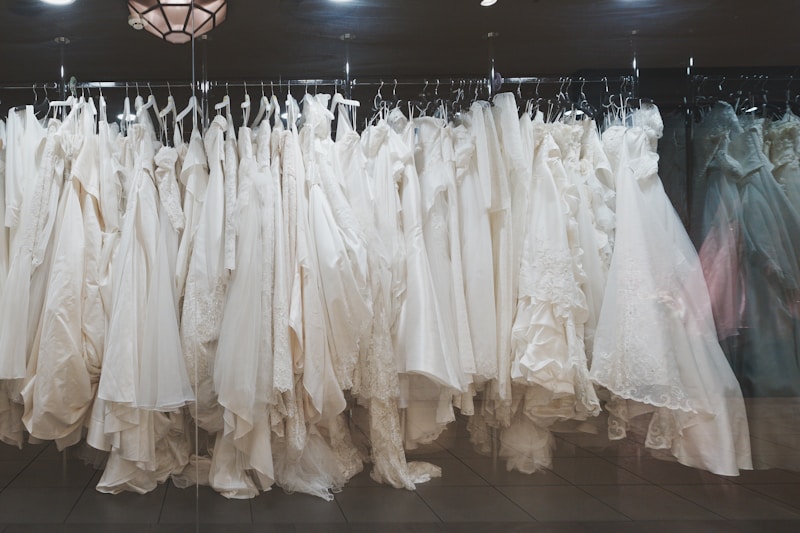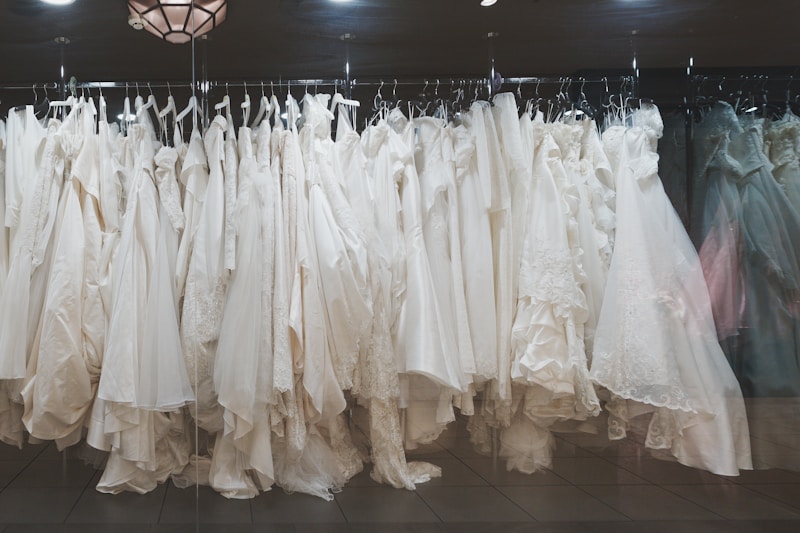Income Tax Planning for Bridal Entrepreneurs: Maximizing Profits and Minimizing Liabilities
In the bustling world of wedding planning, bridal entrepreneurs are carving out a niche that promises both passion and profit. However, just like any other business, managing income tax efficiently is crucial for long-term success. This article delves into effective income tax planning strategies specifically tailored for bridal entrepreneurs, enabling them to maximize profits while minimizing potential tax liabilities.Understanding Income Tax Basics for Bridal EntrepreneursBefore diving into advanced planning strategies, it's essential to grasp the fundamentals of income tax as they apply to bridal entrepreneurs. Whether you're a wedding planner, floral designer, or bridal boutique owner, understanding your tax obligations can help you make informed decisions.Types of Income Tax ApplicableAs a bridal entrepreneur, you may encounter various types of income taxes. Generally, business income is classified as ordinary income, and your net profit will be subject to federal income tax. Depending on your location, state and local taxes may also apply. Below is a summary of the potential types of tax you may face:Type of TaxDescriptionFederal Income TaxTax imposed by the federal government on your business income.State Income TaxTax imposed by your state government, varying in rates and regulations.Self-Employment TaxTax applied to self-employed individuals to cover Social Security and Medicare.Sales TaxTax levied on retail sales of tangible goods, may apply to products sold.Income ...
Navigating Tax Audits for Bridal Store Owners: A Comprehensive Guide
Owning a bridal store can be a rewarding venture, bringing joy to countless couples on their special day. However, like any business, it comes with its own set of challenges, particularly when it comes to financial management and compliance with tax regulations. This article aims to provide invaluable insights into navigating tax audits for bridal store owners, ensuring you remain compliant while minimizing stress during these audits.Understanding Tax AuditsTax audits can be daunting for any business owner. Essentially, a tax audit is an examination of your financial records by tax authorities to ensure the accuracy of your tax returns. For bridal store owners, specific elements can trigger the need for an audit, including inconsistent income reporting and unusually high deductions.Common Reasons for Tax AuditsBridal store owners may face audits due to several reasons:ReasonDescriptionHigh Deduction ClaimsClaiming disproportionately large deductions compared to your income can raise suspicions.Underreported IncomeFailing to report income from all sources, including cash transactions.Mixed Personal and Business ExpensesNot clearly separating personal and business expenses can lead to flagging by tax authorities.Preparing for a Tax AuditPreparation is crucial in navigating tax audits. Here are some steps bridal store owners can take:1. Organize Financial RecordsEnsure that all financial records, including sales receipts, invoices, and bank statements, are well-organized. Consid...
Sales Tax Considerations for Wedding Dress Sales: A Comprehensive Guide
Weddings are a time of celebration, beauty, and, unfortunately for many, financial considerations. When planning a wedding, couples often overlook one critical aspect: sales tax on wedding dress sales. This article delves into the various sales tax implications for wedding dress sales, ensuring that both retailers and brides are well-informed. Let's explore how sales tax can impact your wedding budgeting decisions.Understanding Sales Tax BasicsSales tax is a consumption tax imposed by the government on the sale of goods and services. In the United States, sales tax rates vary from state to state, which creates complexities, especially for wedding dress purchases that may take place across state lines. For those looking to buy or sell wedding dresses, understanding these nuances is crucial.1. What is Sales Tax?Sales tax is a percentage of the sale price of goods. For example, if a wedding dress is priced at $1,000 and the local sales tax rate is 7%, the total cost for the buyer would be $1,070. The seller is then responsible for collecting that $70 in sales tax and remitting it to the state government.2. State-Specific Sales Tax RatesSales tax rates can vary not only from state to state but also by locality. Below is a general overview of some states' sales tax rates applicable to clothing and wedding dresses:StateSales Tax Rate (%)Special ConsiderationsCalifornia7.25% - 10.25%Clothing is generally taxable.New York4% + local rates (up to 4.5%)Wedding dresses are taxable at sta...
Effective Strategies for Managing Business Expenses and Tax Returns for Bridal Shops
Running a bridal shop can be an exciting yet challenging venture. As the owner, you are responsible for managing various aspects, including inventory, customer service, and finances. In this article, we will explore effective strategies for managing business expenses and tax returns specific to bridal shops. By implementing these strategies, you can ensure the financial health of your business while navigating the complex world of taxes.Understanding Business Expenses for Bridal ShopsBridal shops have unique expenses that differ from other retail businesses. Understanding these expenses is crucial for proper financial management. Here are some main categories of expenses you should be aware of:Expense CategoryDescriptionInventory CostsThese include the purchase of bridal gowns, accessories, and other merchandise.Rent and UtilitiesThe cost of leasing a store location and associated utilities.Salaries and WagesPayments to staff, including sales associates and seamstresses.Marketing and AdvertisingExpenses related to promoting your bridal shop, such as social media ads and bridal shows.InsuranceLiability, property, and business insurance necessary for protecting your shop.Miscellaneous ExpensesAny additional costs, such as repairs, office supplies, and software subscriptions.Tracking Business ExpensesMaintaining accurate records of your business expenses is essential for financial success. Here are some effective tracking methods:Use Accounting Software: Invest in reliable accou...
Understanding the Tax Implications of Bridal Shop Inventory Management
The Importance of Inventory Management in Bridal ShopsBridal shops operate in a unique niche of the retail market, where effective inventory management is crucial for both profit maximization and compliance with tax laws. Understanding the tax implications of bridal shop inventory management can help shop owners navigate financial responsibilities while making informed business decisions. This article will explore the tax implications, inventory management strategies, and best practices for bridal shop owners.What Is Inventory Management?Inventory management is the process of ordering, storing, and using a company’s inventory. For bridal shops, it involves not only the management of gowns and accessories, but it also includes understanding how inventory affects financial reporting and tax obligations. Effective inventory management can optimize cash flow and minimize tax liabilities.Key Components of Bridal Shop Inventory ManagementFor bridal shop owners, inventory management includes several key components: Tracking Inventory Levels: Keeping an accurate count of available dresses and accessories. Forecasting Demand: Predicting trends to ensure enough stock of popular items. Inventory Valuation: Determining the value of stock for financial reporting.Tax Implications of Inventory ValuationWhen it comes to tax implications, how bridal shops value their inventory can significantly impact their taxable income. Here's a breakdown of different inventory valuation methods a...
Understanding Tax Responsibilities for Bridal Shop Partnerships
As the wedding industry continues to flourish, many entrepreneurs are seizing the opportunity to start their own bridal shops. However, with this entrepreneurial spirit comes the complex world of tax responsibilities, especially for those forming partnerships. In this article, we will explore the various tax considerations that bridal shop partnerships must be aware of, ensuring that these businesses remain compliant while maximizing their potential for success. We will cover essential topics, including types of partnerships, tax implications, filing requirements, and helpful tips for staying organized with finances.Types of Partnerships in the Bridal IndustryBefore delving into tax responsibilities, it is crucial to understand the different types of partnerships that can exist within the bridal shop industry. There are generally three main types of partnerships: General Partnership: All partners share in the profits, losses, and management responsibilities. Each partner is personally liable for business debts. Limited Partnership: Includes both general partners and limited partners. General partners manage the business, while limited partners only contribute capital and are not involved in daily operations. Limited Liability Partnership (LLP): This structure protects each partner from personal liability for the partnership's debts, offering a layer of security.Tax Implications for Bridal Shop PartnershipsThe tax implications for partnerships in the bridal industry c...
Maximizing Profit Margins: An Essential Guide for Bridal Boutique Owners
In the competitive world of bridal boutiques, optimizing profit margins is crucial for sustained growth and success. As a bridal store owner, you may be wondering how to improve your profitability while providing exceptional service and high-quality products. In this article, we will delve into strategies that can help you enhance your bridal boutique profit margins, address common questions, and provide actionable insights that can be implemented right away.Understanding Profit Margins in the Bridal IndustryProfit margin refers to the percentage of revenue that exceeds the costs of running a business. For bridal boutiques, the profit margin can vary greatly depending on several factors such as location, inventory cost, and the pricing strategy employed. Typically, bridal boutiques can expect a profit margin ranging from 30% to 50%. However, many boutique owners often struggle to optimize these margins.Factors Influencing Bridal Boutique Profit MarginsTo optimize your bridal boutique profit margins effectively, it's vital to understand the key factors influencing profitability. These include: Cost of Goods Sold (COGS): Knowing your COGS helps you price your products appropriately. Location: Rent and operating costs can vary significantly based on your boutique's location. Marketing Expenses: Effective marketing strategies can attract more customers, increasing revenue. Customer Service: Exceptional service fosters loyalty and repeat business.Best Practices for Opt...
Essential Bookkeeping for Bridal Shop Finances: A Comprehensive Guide
Are you a bridal shop owner looking to streamline your finances and ensure a prosperous business? Effective bookkeeping is essential for maintaining the financial health of your shop. In this article, we will walk you through the fundamentals of bookkeeping tailored specifically for bridal shops, while also addressing related queries that can enhance your understanding of managing finances in the bridal industry.Understanding the Importance of Bookkeeping for Bridal ShopsBookkeeping is more than just tracking income and expenses; it's a way to preserve the integrity of your shop's finances. For bridal shops, where costs can fluctuate based on seasonality and customer trends, having a solid bookkeeping system is imperative. This allows you to make informed business decisions and forecasts.Why is Bookkeeping Crucial for Your Bridal Shop?There are several reasons why careful bookkeeping is essential for a bridal shop:Compliance: Maintaining accurate financial records ensures that you comply with local tax laws and regulations.Budgeting: Proper records help in creating a budget that accurately reflects your operational costs and expected sales.Profitability Analysis: Understanding your financial health allows you to identify profitable areas and those that need improvement.Cash Flow Management: Keeping an eye on your cash flow ensures that you can meet your financial obligations.Essential Elements of Bookkeeping for Bridal ShopsTo set up an efficient bookkeeping system for your b...
Tax Credits Available for Bridal Shop Owners: A Comprehensive Guide
Running a bridal shop can be a rewarding venture, especially during peak wedding seasons. However, the financial management of such businesses can also be challenging. Fortunately, there are several tax credits available for bridal shop owners that can help alleviate some of the financial burdens. This article will explore these tax credits, how to qualify for them, and best practices to maximize your benefits.Understanding Tax CreditsBefore diving into specific tax credits, it is crucial to understand what tax credits are. A tax credit directly reduces your tax liability, making it more beneficial than a tax deduction, which only reduces your taxable income. Tax credits can be federal, state, or local, and knowing what’s available can make a significant difference in your overall tax strategy.The Importance of Tax Credits for Bridal Shop OwnersBridal shops often have high operating costs, from inventory to rent and staff salaries. Tax credits can provide substantial relief, allowing you to reinvest in your business. Some relevant tax credits for bridal shop owners include:Tax CreditDescriptionEligibilitySmall Business Health Care Tax CreditHelps small businesses provide health coverage to employees.Must have fewer than 25 full-time employees and average wages below a certain threshold.Work Opportunity Tax Credit (WOTC)Encourages hiring individuals from disadvantaged groups.Must hire eligible employees from specified target groups.Energy-Efficient Commercial Buildings Tax Ded...
Establishing an Effective Tax Filing System for Boutiques
In the vibrant world of boutique retail, managing finances effectively is crucial for the sustainability and growth of the business. One of the most significant aspects of financial management is establishing an effective tax filing system. This article will guide boutique owners through the essential steps for creating a tax filing system that is efficient, compliant, and tailored to their specific needs. We will cover various strategies, best practices, and common mistakes to avoid, helping ensure that your boutique thrives financially while adhering to tax regulations.Understanding the Importance of a Tax Filing SystemTax filing may seem like a daunting task, but it's a necessary step for any boutique looking to establish credibility and ensure compliance with local and federal laws. A well-organized tax system can not only save time but also minimize errors that can lead to penalties or audits.Benefits of an Effective Tax Filing SystemBenefitDescriptionTime EfficiencyA streamlined tax filing system allows for quicker access to financial data, making tax season less stressful.Reduced ErrorsMaintaining organized records helps reduce errors and omissions in tax returns.ComplianceEnsures that the business adheres to state and federal tax regulations, avoiding potential penalties.Financial InsightsA good system provides insights into financial trends, which can guide business decisions.Steps to Establish an Effective Tax Filing System1. Assess Your Business StructureThe first ...
Unlocking Success: Professional Tax Consultations for Bridal Entrepreneurs
Understanding the Importance of Professional Tax ConsultationsIn the bustling world of bridal entrepreneurship, tax considerations can sometimes feel overwhelming. Entrepreneurs in the bridal industry manage their businesses while advising brides on everything from wedding planning to floral arrangements. Additionally, they must navigate the complexities of tax obligations. This is where professional tax consultations become invaluable. By engaging with tax professionals, bridal entrepreneurs can optimize their financial decisions, ensure compliance, and ultimately pave the path to sustained growth and success.The Unique Tax Challenges Faced by Bridal EntrepreneursBridal entrepreneurs have unique financial situations that require specialized tax guidance. They often handle a variety of income streams, from retail sales to service fees. The flexibility of the bridal business model can introduce a myriad of tax challenges, including: Sales Tax Compliance: Determining what items are taxable and the rates specific to their state. Deduction and Credit Maximization: Identifying business expenses that can be deducted to reduce taxable income. Self-Employment Tax: Understanding obligations as self-employed individuals.Given these complexities, seeking professional tax consultations can ensure compliance and save money in the long run.Benefits of Professional Tax ConsultationsHiring a tax consultant can offer bridal entrepreneurs a range of benefits. Here are some key advanta...
Gifting and Tax Regulations for Bridal Businesses: A Comprehensive Guide
In the realm of bridal businesses, understanding the intricacies of gifting and tax regulations is crucial for both compliance and strategic financial planning. As the bridal industry continues to flourish, entrepreneurs must navigate through an array of legal obligations and opportunities. This article delves into the key aspects of gifting and tax regulations relevant to bridal businesses, ensuring that you are well-equipped to handle these important matters with confidence.Understanding Gifting in the Bridal IndustryThe concept of gifting in the bridal industry encompasses a variety of practices, from offering complimentary items to wedding clients to corporate gifts for vendors and partners. Each of these aspects has its own set of regulations that must be followed to ensure legal compliance and maximize potential benefits.Types of GiftingType of GiftDescriptionPromotional GiftsItems given to potential clients to promote services.Client Appreciation GiftsGifts given to clients post-service to show gratitude.Corporate GiftsGifts to vendors or partners to foster business relationships.Understanding these categories can help bridal businesses make informed decisions about their gifting strategies while remaining compliant with tax regulations.Tax Implications of GiftingIn the United States, the IRS has specific guidelines governing the tax implications of gifts. For 2023, the annual exclusion limit for gifts is $17,000 per recipient. This means that any gifts given beyond th...
Understanding the Tax Implications of Bridal Shop Employee Payroll
As the bridal industry continues to grow, understanding the tax implications of employee payroll in bridal shops becomes increasingly essential. Bridal shop owners not only need to ensure their employees are compensated fairly but also need to navigate the complex landscape of payroll taxes and regulations. This article delves into the intricacies of tax implications related to bridal shop employee payroll, with a focus on various factors such as wage classifications, tax filings, and common pitfalls to avoid. What are Payroll Taxes? Payroll taxes are the taxes that employers must withhold from employees' wages and also contribute to federal and state governments. Understanding these taxes is crucial for bridal shop owners to avoid penalties and ensure compliance with tax regulations. Below are the key components of payroll taxes: Type of Tax Description Federal Income Tax Tax withheld based on employees' earnings and their filing status. Social Security Tax A federal tax that funds Social Security, capped at a certain income level annually. Medicare Tax A federal tax to fund Medicare, with no income cap. State Income Tax Varies by state, based on employees' earnings. FUTA Tax Federal Unemployment Tax Act tax, used to fund unemployment benefits. Understanding Employee Classifications One of the first steps for bridal shop owners is to correctly classify their employees. Misclassifying employees as independent contractors can lead ...
Essential Tax Strategies for Bridal Shop Owners Preparing for Retirement
Understanding Retirement Tax Strategies for Bridal Shop OwnersThe journey of owning a bridal shop is filled with dreams, creativity, and the joy of helping couples celebrate their love. However, as a bridal shop owner, one crucial aspect you might not often think about is your retirement planning. This article delves into effective retirement tax strategies specifically designed for bridal shop owners, ensuring you keep your hard-earned money where it belongs—in your pockets.Why Retirement Planning Matters for Bridal Shop OwnersRetirement may seem distant when you are immersed in managing your business, but planning ahead is essential. As a bridal shop owner, you face unique challenges, including fluctuating revenues, seasonal business spikes, and the need for effective tax management. An intricately planned retirement strategy allows you to maximize your savings while minimizing your tax burdens.Key Retirement Tax Strategies for Bridal Shop OwnersStrategyDescriptionBenefits1. Self-Directed Retirement Accounts (SDRAs)Utilize a self-directed IRA or Solo 401(k) to invest in various assets, including your business.Flexible investment options and potential tax advantages.2. Deductible Retirement ContributionsContribute to retirement plans, reducing your taxable income.Lower tax burden while saving for retirement.3. Health Savings Accounts (HSAs)Set up an HSA to save for medical expenses tax-free.Tax-free withdrawals for qualified medical expenses.4. Business StructuringConsider t...
Effective Financial Management Techniques for Bridal Shops
Mastering Financial Management in Bridal ShopsIn today's competitive wedding industry, bridal shop owners must employ effective financial management techniques to ensure sustainable growth and profitability. With the varying demands of customers and the ups and downs of market trends, it is crucial for bridal shops to adopt strategies that not only keep the business afloat but also set it on a path to success. This article discusses various financial management techniques tailored for bridal shop owners, providing insights into how to optimize operations and enhance profitability.Understanding the Importance of Financial ManagementFinancial management involves organizing and planning a bridal shop’s financial resources, tracking performance, and making informed decisions to maximize profits. By implementing sound financial practices, owners can:Maintain cash flowControl costsEnhance profitabilityMake strategic investmentsPrepare for unexpected expensesTo thrive in the bridal industry, it's vital to understand and apply these financial management techniques with precision.Essential Financial Management Techniques for Bridal Shops1. Accurate BudgetingCreating a detailed budget is the cornerstone of financial management for any bridal shop. Owners should:Estimate monthly sales based on historical data and market trends.Account for fixed and variable expenses such as rent, utilities, salaries, and inventory purchases.Set aside a contingency fund for unexpected expenses or emergen...
Maximize Your Bridal Shop's Efficiency with Financial Software for Tax Preparation
As a bridal shop owner, understanding the complexities of tax preparation can often feel overwhelming. With fluctuating tax laws and unique financial considerations specific to the bridal industry, you need a reliable solution to streamline this process. That's where financial software for bridal shop tax preparation comes into play.The Importance of Financial Software for Bridal ShopsManaging finances effectively is crucial for the success of any bridal shop. Financial software is designed to help business owners track income, expenses, and ensure compliance with tax regulations. Especially during tax season, having the right tools can make a world of difference. Here’s a comparison table that highlights the benefits of using financial software:BenefitDescriptionEfficiencyAutomated processes reduce the time spent on bookkeeping and preparing tax documents.AccuracyMinimize errors in calculations, which can lead to costly penalties and headaches.ComplianceStay updated with the latest tax laws and regulations tailored for the bridal industry.Easy AccessCloud-based solutions allow you to access financial data anytime, anywhere.ReportingGenerate financial reports quickly to make informed business decisions.Key Features of Financial Software for Bridal Shop Tax PreparationWhen choosing financial software for your bridal shop, it's essential to look for specific features that will assist in tax preparation. Here are some key functionalities to consider:1. Expense TrackingThe softwa...
Maximizing Tax Deductions for Bridal Businesses: A Comprehensive Guide
Understanding Tax Deductions for Bridal BusinessesThe bridal business is a flourishing industry, characterized by its unique expenses and financial challenges. As a bridal business owner, it is crucial to be well-versed in the tax deductions available to you. In this guide, we shall explore various aspects of tax deductions specific to bridal businesses, helping you save money and optimize your financial health.What Are Tax Deductions?Tax deductions are expenses that you can deduct from your taxable income, reducing the amount of income that is subject to taxation. For bridal businesses, understanding what qualifies as a tax-deductible expense can lead to significant savings. Here are some common tax deductions relevant to bridal enterprises:Expense TypeDescriptionBusiness ExpensesCosts required to maintain your bridal business such as rent, utilities, and office supplies.Employee WagesSalaries or hourly wages paid to employees, as well as any benefits provided.Advertising and MarketingCosts associated with promoting your business, including online ads, bridal shows, and printed materials.Inventory CostsExpenses related to purchasing or manufacturing bridal gowns, accessories, and other inventory items.Travel ExpensesCosts for traveling to bridal fairs, meeting clients, or visiting suppliers. This can include gas, airfare, and lodging.Professional ServicesFees for services rendered by accountants, consultants, and other professionals.Common Tax Write-Offs for Bridal Businesse...
Effective Bridal Shop Tax Management Strategies for Optimal Financial Health
When operating a bridal shop, managing taxes may not be the most glamorous aspect of running the business, yet it is crucial for long-term success and financial stability. As the bridal industry is often seasonal and can involve significant expenses, understanding effective tax management strategies is essential. In this article, we will explore various tax management strategies specifically tailored for bridal shop owners, providing insights to maximize profits, minimize liabilities, and ensure compliance with tax regulations. Understanding the Tax Landscape for Bridal Shops Bridal shops are subject to a variety of taxes, including sales tax, income tax, and payroll tax, among others. Each type of tax will impact your shop differently. It's important to understand how these taxes apply to your business to develop effective tax strategies. Type of TaxImpact on Bridal ShopsSales TaxApplicable on the sale of wedding dresses and accessories, requiring proper registration and remittance.Income TaxA portion of net earnings that must be reported to the IRS and state tax authorities.Payroll TaxEmployers must withhold and pay taxes for employees, which can be substantial depending on your staff size. Key Tax Management Strategies for Bridal Shop Owners Implementing effective tax management strategies can save bridal shop owners both time and money. Here are some key strategies to consider: 1. Keep Accurate Records Maintaining thorough and organized records of income and expe...
Effective Record-Keeping for Wedding Boutiques: A Comprehensive Guide
In the ever-evolving world of wedding planning, wedding boutiques play a crucial role. They offer a wide range of products and services, from bridal gowns to accessories. However, managing a wedding boutique is not solely about style and fashion; it also involves efficient business practices, particularly effective record-keeping. In this article, we will explore the best strategies for effective record-keeping for wedding boutiques, ensuring that your business remains organized and profitable.The Importance of Record-KeepingRecord-keeping is an essential part of running any successful business, including wedding boutiques. Here are a few key reasons why effective record-keeping is crucial: Financial Management: Accurate records of sales, expenses, and inventory are vital for understanding your boutique's financial health. Regulatory Compliance: Many areas have specific requirements for business record-keeping that must be adhered to. Customer Relations: Well-maintained customer records facilitate better service and personalized experiences. Inventory Control: Keeping track of your inventory prevents stock shortages and overages, helping maintain cash flow.Types of Records to MaintainWedding boutiques need to keep various types of records to ensure smooth operations. Here are some essential records:Record TypeDescriptionSales RecordsTrack daily sales, refund reports, and completed transactions.Expense RecordsDocument all business-related expenses, including rent, ...
Understanding Sales Tax Regulations for Bridal Shops: A Comprehensive Guide
As a bridal shop owner, navigating the complexities of sales tax regulations can be daunting. Sales tax is a crucial component of retail operations, impacting pricing strategies, inventory management, and overall profitability. This article delves into the intricacies of understanding sales tax regulations specific to bridal shops, offering valuable insights that can help you effectively manage this essential aspect of your business.The Basics of Sales TaxSales tax is a consumption tax imposed by state and local governments on the sale of goods and services. For bridal shops, this primarily applies to the sale of wedding dresses, accessories, and related services. Understanding where, when, and how much tax to collect is fundamental for compliance and financial success.The Importance of RegistrationBefore charging sales tax, bridal shops must register with their state’s tax authority. This registration process not only legitimizes your business but also provides you with the necessary permits to collect tax from customers. Different states have varying requirements for registration, including possible fees and the need for additional documentation.Sales Tax and Bridal ProductsKnowing which products are taxable is paramount. Here’s a summary of common bridal shop items and their sales tax statuses:ItemTaxable StatusWedding DressesGenerally taxableBridal Accessories (Veils, Tiaras)Generally taxableAlteration ServicesVaries by stateWedding Planning ServicesTypically non-taxableI...



















